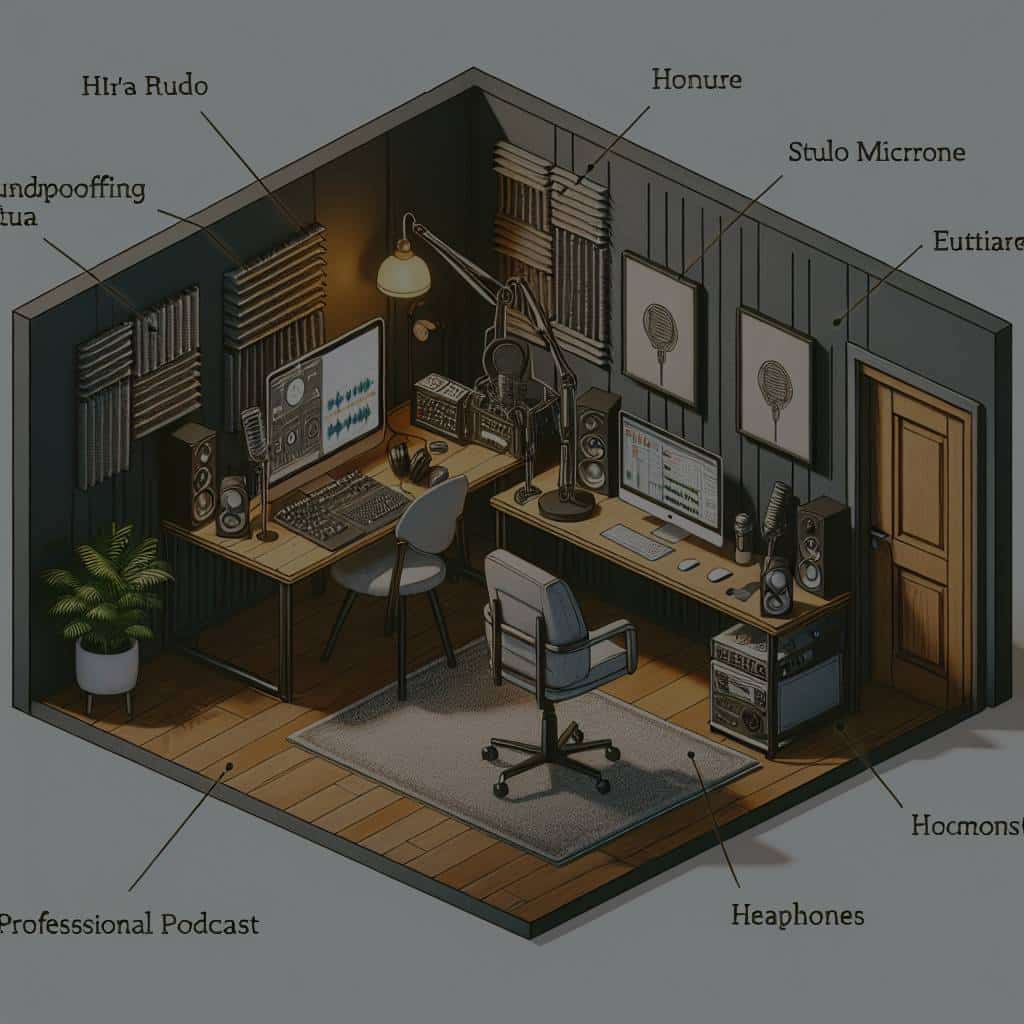In the digital age, podcasts have become an incredibly popular medium of communication. They allow anyone with a story to tell, a perspective to share, or knowledge to impart to reach a global audience. For those of you aspiring to build a home-based professional podcast studio, the question becomes: What’s the most efficient layout for it?
Designing a podcast studio in the comfort of your own home allows you to take control of your podcasting journey while also providing a comfortable and personalized space for your creativity to flourish. However, structuring your studio for optimal sound quality and efficiency can be a challenge. From selecting the right room to choosing your audio equipment, this article will guide you through the process of constructing a studio that meets your podcasting needs.
Have you seen this : How to Design a Small Home Theater with Acoustic Enhancements for Optimal Sound?
Selecting the Right Room for Your Podcast Studio
Before you start buying any equipment, the first step in setting up your home podcast studio is selecting the right room. This decision can significantly affect the sound quality of your recordings, so don’t underestimate its importance.
The room you choose must be as quiet as possible to reduce background noise. You’d ideally want a room with minimal windows and doors, as these can let in noise from the outside world. The size of the room can also impact the sound quality; a larger room might echo, while a smaller room might sound too closed off. The ideal room size should easily accommodate your equipment without causing audio distortion.
Also to discover : What’s the Best Way to Implement a Greywater System in a Suburban Home?
Additionally, consider the room’s acoustics. Rooms with carpeted floors and a lot of furnishings absorb sound better than bare rooms, reducing echo. However, if your selected room doesn’t possess these characteristics, don’t be discouraged. You can always adjust the acoustics with some strategic changes.
Tailoring Your Room Acoustics
While the perfect room may not exist in your home, you can make alterations to optimize your selected space. Remember, the goal is to create a clear, crisp recording without ambient noise and echo.
Start by eliminating sources of noise. Turn off appliances, close windows, and consider soundproofing the room. Soundproofing doesn’t have to be expensive; thick curtains, carpeting, or foam panels can help reduce echo and external noise.
Next, consider the room’s layout. Arrange your furniture strategically to absorb sound and prevent your voice from bouncing off the walls. A bookshelf filled with books, for instance, can act as a great sound absorber.
Lighting is another factor to consider. Although it doesn’t directly impact the sound quality, adequate lighting can create a conducive environment for podcasting, especially if you plan on incorporating video.
Choosing the Right Audio Equipment
After selecting and tailoring your room, the next step is to invest in the right audio equipment. The quality of your podcast heavily relies on your audio equipment. Listeners will likely disregard a podcast with poor sound quality, regardless of the content.
The essential equipment you’ll need includes a microphone, headphones, a pop filter, and an audio interface.
When it comes to microphones, invest in a good quality condenser or dynamic microphone. Both have their pros and cons, but for a home studio, a dynamic microphone might be preferable as they are less sensitive to background noise.
Headphones are crucial to monitor your audio as you record. You’ll need comfortable, over-ear headphones that can isolate sound.
A pop filter can drastically reduce the popping sounds that occur when certain consonants are spoken into the microphone.
Finally, an audio interface is essential if you’re using a microphone that requires an XLR cable for connection. It converts the analog signal from your microphone into a digital signal your computer can process.
Configuring Your Computer for Podcasting
Your computer is a vital part of your podcast studio setup. You’ll be using it for recording, editing, and publishing your podcast episodes.
When it comes to your computer, you need to ensure it has sufficient memory and processing power to run your recording software smoothly. You don’t want to be in the middle of a great podcast recording only to have your computer crash.
Choose recording software that suits your budget and experience level. Some popular options include Audacity, GarageBand, and Adobe Audition. These programs allow you to record, edit, and master your podcast episodes.
Organizing Your Space Efficiently
Having a well-organized studio can enhance your productivity. Ensure your equipment is easy to access and your desk is clutter-free. The less time you spend fidgeting with cables and searching for equipment, the more time you can dedicate to producing quality podcast content.
Consider the placement of your equipment. Your microphone should be at a comfortable height, and your computer should be in a position where you can easily control your recording software.
Finally, make sure you have a comfortable chair. Podcasting often involves long hours sitting down, so investing in a chair that supports good posture can make a significant difference in your comfort and productivity.
Establishing a home-based professional podcast studio involves careful planning and consideration. However, with the right room, acoustics, equipment, computer setup, and organization, you can create a space that not only looks professional but also delivers high-quality sound for your listeners.
Optimal Lighting and Decor for Your Podcast Studio
When setting up a home podcast studio, it’s easy to get caught up in the technical aspects and forget about the aesthetics and comfort level of your studio. However, these elements can significantly impact your productivity and the overall quality of your podcast.
Lighting is one of the overlooked aspects of a studio setup. For an audio-only podcast, lighting might not seem necessary. But remember, you’re going to be spending a lot of time in your studio. Proper lighting can help reduce eye strain, create a conducive working environment, and even boost your mood. Consider using a mix of natural and artificial light. Daylight bulbs can replicate natural light, helping to maintain your energy levels during long recording sessions.
If you’re planning on incorporating video into your podcast, lighting becomes even more important. In this case, you’d want to invest in some good studio lights to ensure your video footage is clear and professional-looking.
Decorating your studio also plays a crucial role in creating a pleasant and inspiring environment. Your podcast room should reflect your style and the tone of your podcast. You could hang artworks or photos, display books or memorabilia, or even add some plants for a touch of natural beauty.
Remember, the decor should not interfere with your sound quality. Avoid items that could reflect or distort the sound. Your studio should look good, but not at the expense of audio quality.
Conclusion: Building Your Dream Podcast Studio
Creating a home-based professional podcast studio might seem daunting, but with careful planning and thoughtful decisions, you can build a space that not only meets your technical needs but is also a comfortable and inspiring place to work.
Choosing the right room and optimizing the acoustics is the first step to achieving excellent sound quality. Investing in the right audio equipment will ensure your podcast has professional-level audio quality that keeps your listeners engaged. Your computer setup is equally important to ensure smooth recording and editing processes.
Meanwhile, organizing your space efficiently will enhance your productivity, and setting up optimal lighting and decor will create a conducive and pleasant working environment. Whether you’re doing an audio podcast or a video podcast, your studio design should serve your needs and reflect your style.
Building your home podcast studio is an exciting journey. Every choice you make, from the microphone to the decor, contributes to the quality of your podcast recording and the enjoyment of your podcasting experience. So, start podcasting right from the comfort of your home office, and let your voice reach the world.











